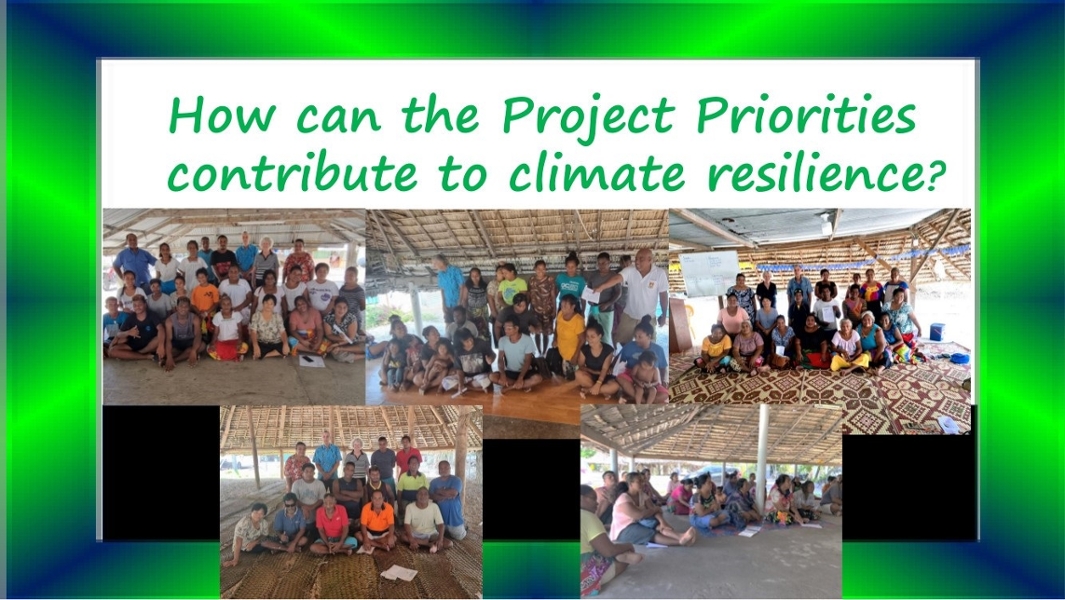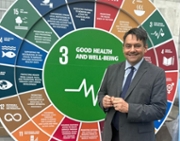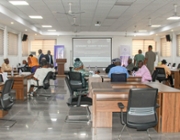CLGF and partners tackle climate impact on food

02 October 2024
The Pacific nation of Kiribati is pioneering blue and green development with a bold step toward climate resilience and sustainability. Working with a number of partners, including CLGF, Kiribati is embarking on an ambitious journey toward a sustainable future with its groundbreaking blue and green development project. Funded by the German International Climate Initiative (IKI), this initiative fuses land-based (green) and coastal marine (blue) approaches to help local communities confront the escalating threats of climate change. By focusing on sustainable agriculture, fisheries, and waste management, the project aims to boost climate resilience, enhance food security, and nurture stronger, healthier communities throughout the islands.
Climate impact on food systems
A pressing issue the project tackles is the profound impact of climate change on Kiribati's food systems. Rising temperatures and erratic weather patterns are making it increasingly difficult to cultivate fresh food, forcing many urban families to rely on low-quality, imported products, exacerbating malnutrition and health problems. The COVID-19 pandemic exposed this vulnerability, highlighting the country's dependence on imports and the urgent need to strengthen local food systems. In response, the project is developing Climate and COVID Resilience Plans (CCRPs) for two local councils, using vulnerability assessments to guide action. Through innovations such as soil improvement techniques and climate-resilient food gardens, the Blue and Green Development Project seeks to ensure a steady supply of nutritious, affordable food despite the shifting climate.
A global partnership for local solutions
This visionary project is the result of a global collaboration involving ICLEI (Local Governments for Sustainability), the Commonwealth Local Government Forum (CLGF), and the Kiribati Local Government Association (KiLGA). Together, they are empowering ten communities in South Tarawa—five from the Teinainao Urban Council (TUC) and five from the Betio Town Council (BTC)—to lead climate resilience efforts and help their communities recover from the pandemic’s devastating effects.
Innovative techniques on land and in the sea
Supported by ICLEI and CLGF, the project is experimenting with innovative techniques, such as sea grape and seaweed farming, which not only improve lagoon water quality but also provide vital nutrients to supplement the lack of green vegetables in Tarawa. The initiative also focuses on transforming food processing waste into useful products for local businesses. On land, the project is promoting climate-resilient farming methods, with each community setting its priorities to ensure the solutions meet their unique needs. Agriculture has emerged as a primary focus for most of these communities.
Pioneering Solutions for Food Security
In densely populated areas like Betio, where land is scarce, the project is introducing alternative farming techniques that require less space, soil, and water. These innovations could offer a lifeline to vulnerable communities facing food insecurity. One promising solution is the use of biochar, which enhances soil fertility. By mixing biochar with compost and using it in trenches and also in raised containers, the soil becomes more resistant to salt, and alkaline soils are neutralised, allowing salt-tolerant vegetables to thrive. The project is also reviving traditional practices like composting seaweed to create sustainable fertilisers. Aquaponics, another cutting-edge method, is being considered for future implementation.
Communities in TUC and BTC are being guided by CLGF technical experts including also local experts who are helping them blend traditional knowledge with modern science to create climate strategies tailored to their specific challenges. Although BTC joined the project later than TUC due to internal council issues, it is now rapidly catching up. Drawing from TUC’s experience, BTC has begun conducting climate risk assessments and implementing action plans to mitigate vulnerabilities and prepare for future risks. In BTC, selected communities are drawn from various faith groups, while TUC communities represent a diverse range of villages.
Many households in both TUC and BTC have embraced home gardening, which is fostering healthier diets and enhancing financial independence, especially for women and the elderly who previously had limited employment opportunities. Some families are even selling surplus vegetables within their neighbourhoods, contributing to a growing local economy. Given the scarcity and high cost of fresh produce in Tarawa, these efforts not only supply nutritious food but also generate additional income. Families especially the women are using this extra money to cover school-related expenses, such as uniforms and lunches, providing their children with more diverse, wholesome meals. In one notable instance, a community is using proceeds from vegetable sales to offer free transportation, ensuring children can attend school without added financial burden.
Empowering leadership through the maneaba system
A standout feature of the blue and green development project is its integration of the traditional maneaba (community meeting house) governance system, working alongside local and national governments. A key objective of the project is to strengthen leadership within local communities. Through workshops focused on strategic thinking, financial management, and other leadership skills, community leaders are being equipped to manage resources and tackle climate challenges head-on. These leaders now stand at the forefront of Kiribati’s climate resilience efforts, guiding their communities with newfound confidence in the face of environmental changes.
Traditionally, the maneaba system has been male-dominated, with women excluded from decision-making. However, in Tarawa, where diverse populations from different islands mix, the system has loosened, and women now often seen sitting alongside men during important discussions, particularly in church settings. An interesting finding from the IKI projects is that women, alongside the elderly, have become the most active participants, driving the project forward. Women hold significant sway in the maneaba, as they frequently control vital information and provide the data needed for informed decisions. Their growing role in decision-making, coupled with their ability and keenness in gardening, has reinforced their indispensable contribution to the project’s success.
Looking forward: Kiribati as a beacon of climate innovation
As the project continues to evolve, the lessons learned from TUC and BTC will be shared with other communities throughout Kiribati. The blue and green development project marks a significant milestone in the country’s journey toward sustainability and resilience, with local governments playing a pivotal role in shaping this vision.
CLGF's Head of the Pacific Region, Ms Karibati Taoaba explained that, by blending cutting-edge technology with time-honoured traditional practices, Kiribati is positioning itself as a leader in climate innovation, offering hope and inspiration to other Pacific Island nations grappling with similar challenges. This initiative not only strengthens Kiribati’s own climate resilience but also serves as a model for sustainable development, one that can be adapted and replicated across the region, ensuring a brighter and more secure future for all.
Back to News





